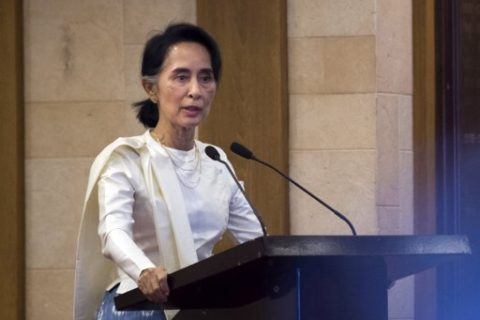
LONDON, United Kingdom (AFP) — Aung San Suu Kyi has denied the ethnic cleansing of Myanmar’s Muslim minority, speaking to the BBC after the United Nations rights council agreed to investigate allegations against the army.
“I don’t think there is ethnic cleansing going on. I think ethnic cleansing is too strong an expression to use for what is happening,” Suu Kyi said in the interview televised on Wednesday.
Her one-year-old government has faced international condemnation for the treatment of the country’s Rohingya Muslims, who are regarded as illegal immigrants from Bangladesh, prompting the UN rights council to agree last month to launch an investigation into violations against the minority.
The Geneva-based body’s fact-finding mission will examine allegations of torture, murder and rape allegedly committed by troops.
Suu Kyi told the BBC there was “a lot of hostility” in the western state of Rakhine, where more than one million Rohingya live.
“It is Muslims killing Muslims, as well, if they think they are collaborating with authorities. It is not just a matter of ethnic cleansing. It is a matter of people on different sides of a divide, and this divide we are trying to close up. As best as possible and not to widen it further,” she said.
Myanmar has launched its own domestic probe into possible crimes in Rakhine and appointed former UN chief Kofi Annan to head a commission tasked with healing long-simmering divisions between Buddhists and Muslims.
Suu Kyi said the army was “not free to rape, pillage and torture.”
“They are free to go in and fight. And of course, that is in the constitution… Military matters are to be left to the army,” she said, adding that she aimed to amend the constitution.
Almost 75,000 people from the persecuted minority have escaped to Bangladesh after the military launched operations in the north of Rakhine state to find Rohingya militants who raided police border posts in October.
Rohingya who have fled have told the UN rights office that soldiers executed babies in front of their mothers, as part of campaign to terrorise the Muslim minority.
“If they come back they will be safe,” said Suu Kyi, adding that those who fled were welcome to return.
Her National League for Democracy (NLD) faced the ballot box on Saturday in by-elections across the country, winning a string of seats but losing out in ethnic minority areas including Rakhine.
The NLD came to power in a historic 2015 election which ended half a century of brutal military rule, but there has been disillusionment with the administration as it struggles to push through reforms and ease unrest.







